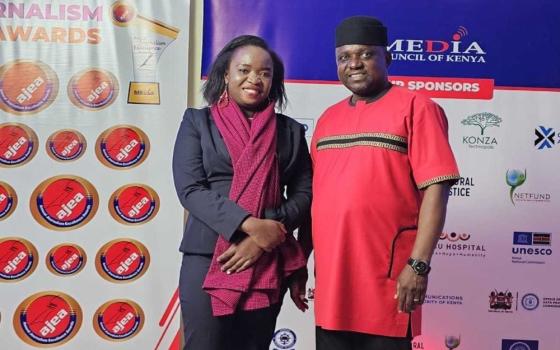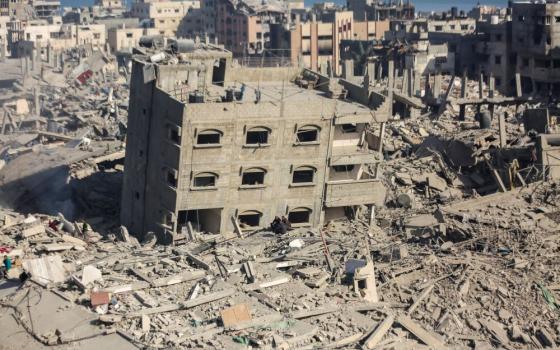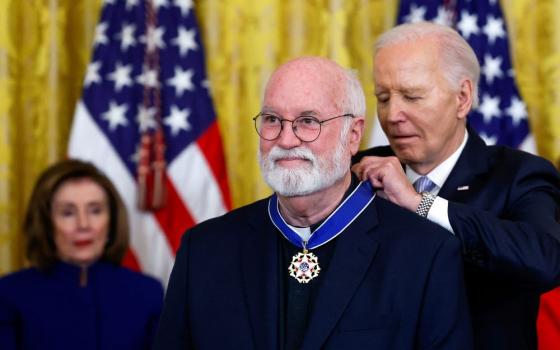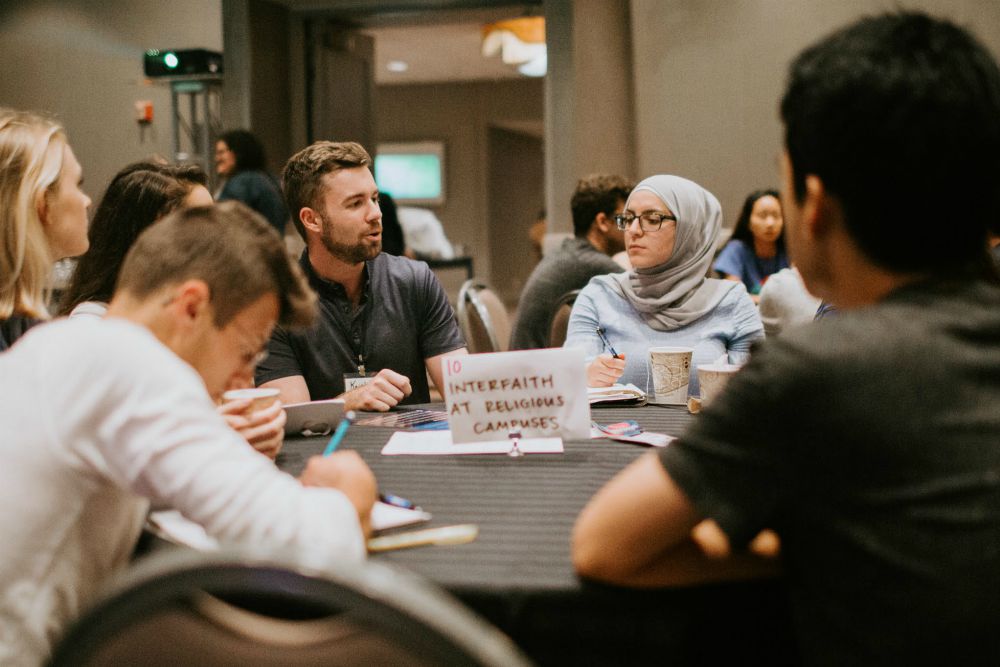
Students discuss how interfaith issues affect religiously-affiliated campuses during the 2018 Interfaith Leadership Institute, Aug. 3-5 in Chicago. (Courtesy of Interfaith Youth Core)
Students and educators from around the country gathered Aug. 3-5 in Chicago to share stories, build relationships with people of different backgrounds, and equip themselves with the skill set needed to lead interfaith conversations in the future, for the good of their religious communities and the world.
The Interfaith Leadership Institute is hosted by the Interfaith Youth Core, an organization founded by Eboo Patel, a former member of President Barack Obama's inaugural Advisory Council on Faith-Based Neighborhood Partnerships. The Interfaith Youth Core, according to its mission statement, "partners with colleges and universities working to turn religious diversity into a positive force in our society."
"The Interfaith Leadership Institute (ILI) is the largest gathering of students and educators with a commitment to American religious pluralism," the organization says of the conference, "Over the course of three days, participants learn to bridge divides and forge friendships across lines of religious and worldview differences." This year, Patel reported that nearly 150 campus delegations participated.
After arriving at the conference, students and educators broke into different tracks depending on their experience and interests. New students could choose between Storytelling for Interfaith Cooperation and Foundations of Interfaith Leadership, while advanced students could choose from two other options, Tackling Challenging Conversations and Interfaith Beyond Graduation.
From the beginning of the conference, there was an emphasis on "how life events can shape" a person's worldview, Erin Sellberg, a junior from Loras College, told NCR. Sellberg, who identifies as a "questioning" Catholic, attended her first Interfaith Leadership Institute and participated in the Foundations of Interfaith Leadership track.
She noted that many of the other students she spoke with had taken the religion of their parents and "made it their own." Many LGBT Catholics who participated talked about "navigating a lot of judgement but making Catholicism their own. … [They are] able to identify with the parts of Catholicism that resonated with them," she said.
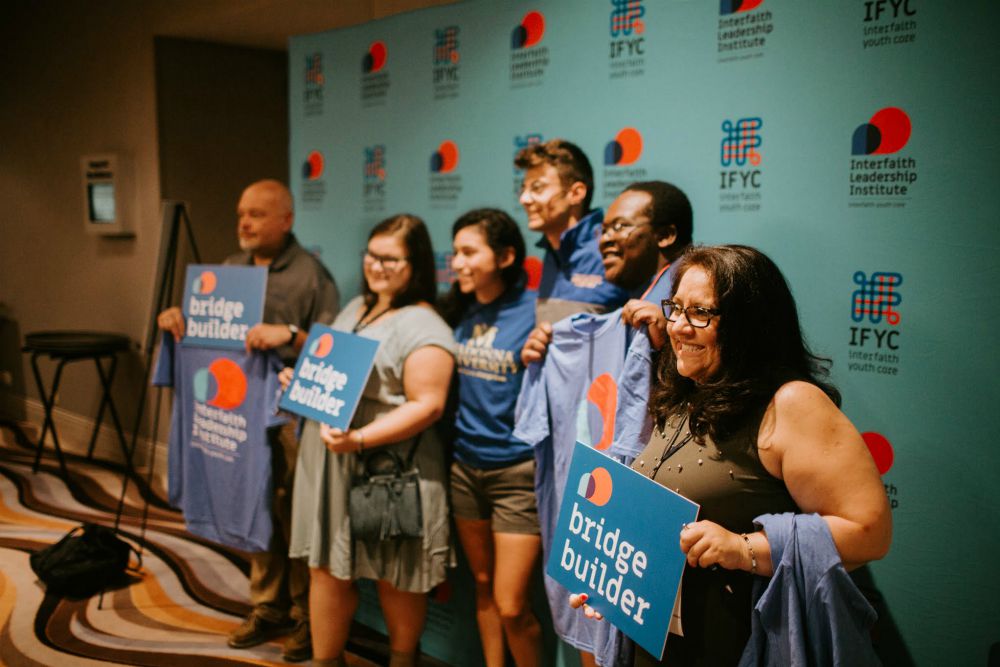
A campus delegation gathers for a photograph during registration the 2018 Interfaith Leadership Institute. (Courtesy of Interfaith Youth Core)
Melanie-Prejean Sullivan, former director of campus ministry at Bellarmine University, in Louisville, Kentucky, who has attended the conference before, said that sharing personal faith experiences like the one Sellberg described is the best way to get students engaged, as they are often afraid of their faith being challenged and lack the education to defend all of its beliefs and practices.
"The perception is you're going to be talking about dogma, or teachings, or beliefs, or creeds, and that the questions will be so technical that they'll be lost," Sullivan told NCR. When people share their personal faith journeys, however, "you're telling about experience. … You may not be an expert in the field of, say, Roman Catholicism, but you can say why you like being Catholic, or why you choose to remain Catholic when you have different options when you leave home."
In another example, a Muslim student "really opened my eyes that there's no one way to be a woman," Sellberg said, observing that in Western countries many elements of an Islamic identity, such as the hijab or other dress for women, are viewed as misogynistic, but those elements have very different meanings for people from those cultures. "She felt kind of indoctrinated into Western ideals of feminism, but there's so many different ways [to be] a strong and confidant woman in different parts of the world," Sellberg said.
Interfaith Youth Core believes these kinds of conversations are extremely important in finding common ground and understanding.
"According to social science research," the organization says on its website, "relationships, positive attitudes and appreciative knowledge are closely related to each other such that an increase in one leads to an increase in the others. If you know some accurate and positive things about a religion, and you know some people from that religion, you are far more likely to have positive attitudes towards that tradition and that community."
As the conference wound down, students talked about their engagement in interfaith dialogue on their campuses, and how they could potentially get more people from their colleges and universities involved.
Advertisement
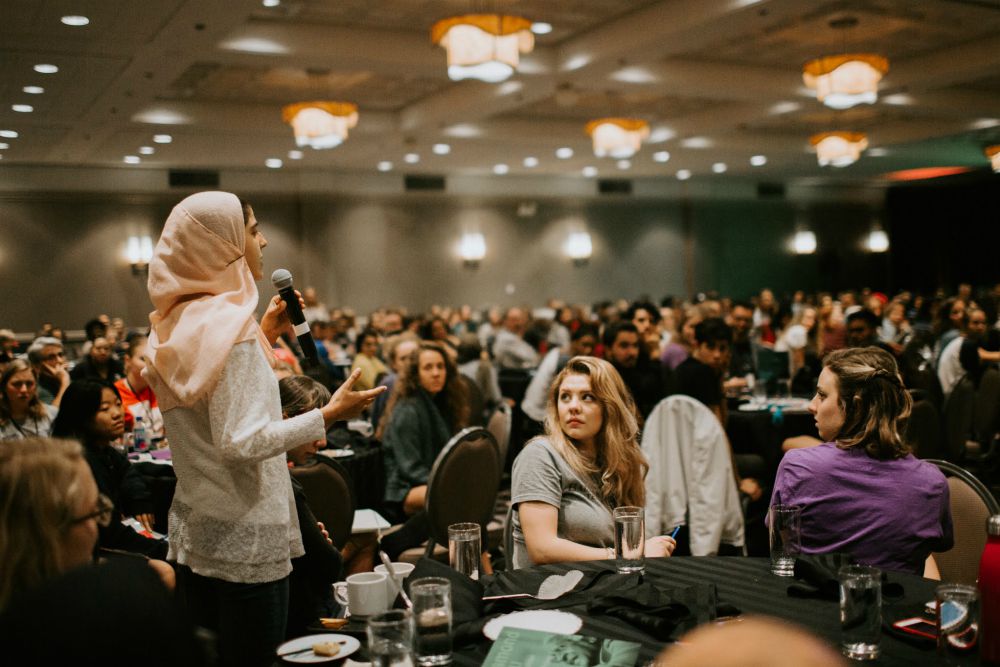
A student asks a question during Saturday's panel discussion, Aug. 4. (Courtesy of Interfaith Youth Core)
"For me, we're thinking about how to incorporate food to get people to come to our events, but also work on not tokenizing people," Sellberg said. Withabout 1,600 students and located in Dubuque, Iowa, Loras is not an especially diverse campus, Sellberg added, and she wants people to be involved in interfaith discussions because they want to, not because they feel like they are invited to provide an alternative or minority perspective.
Cassadi McGrath, a Bellarmine student who identifies as pagan and was attending for her first time, also noted that there were opportunities for interfaith work to have an impact outside of the communities involved in the dialogue. McGrath told NCR that she and "other students I spoke to see interfaith work being more of a presence in the global conversation" in the future.
McDermott agreed, noting that the conversations have expanded since her first conference from focusing on increasing interfaith understanding, to using the interfaith cooperation for good of the wider culture. "When I was first there, we talked a lot more about pluralism," and specifically religious pluralism, she said. At this meeting, she says she saw more questions like, "How do we take that group to go out, in a civic way, to build up the common good?"
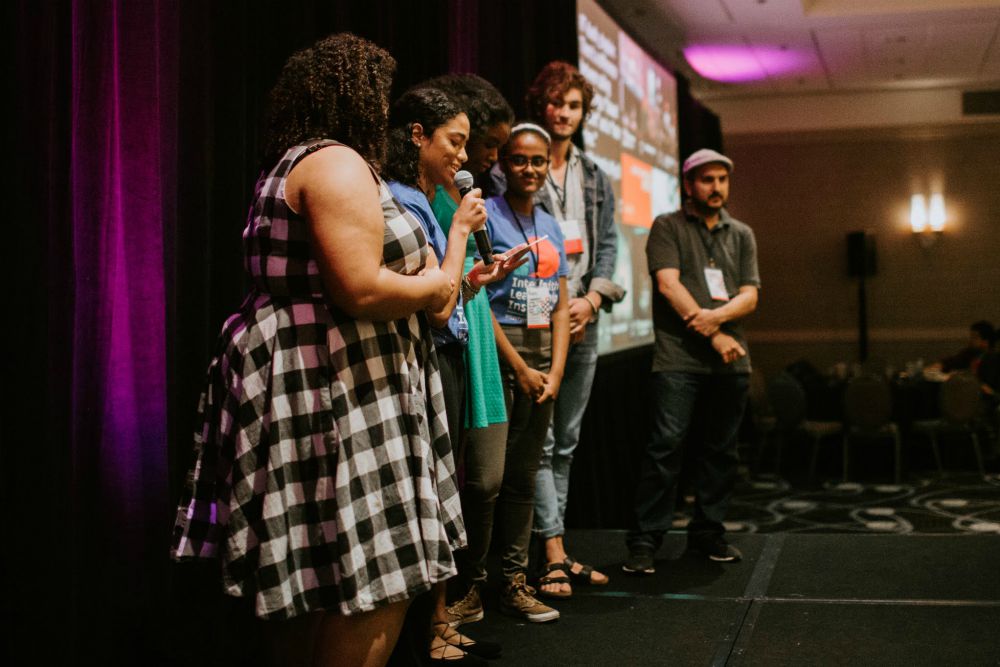
Students speak about their Interfaith Leadership Institute experience during closing session. (Courtesy of Interfaith Youth Core)
Though the conference was nonpartisan, the current state of polarization in the country did not go unnoted.
"The people who choose to come to this conference are committed to this work, no matter what's going on in Washington, D.C. But there were certainly opportunities for those of us in this work to address the tense climate," Sullivan told NCR.
In his keynote speech to the conference, Patel reminded attendees that in times like these, interfaith work can be challenging, but that they are answering an important call.
"I do not for a second want you to think that I believe this is going to be easy," Patel said. "We have signed up for the hard work of being interfaith leaders in at a time in which large swaths of people have weaponized their identities and are wounding one another. It is enormously tempting in that situation to circle around your flag, burrow into your bunker, declare those outside your lines the enemy and fire away. … And in a situation when hurt is all around, some group of people has to stand up and be healers."
[James Dearie is an NCR Bertelsen intern. Contact him at jdeaire@ncronline.org]








